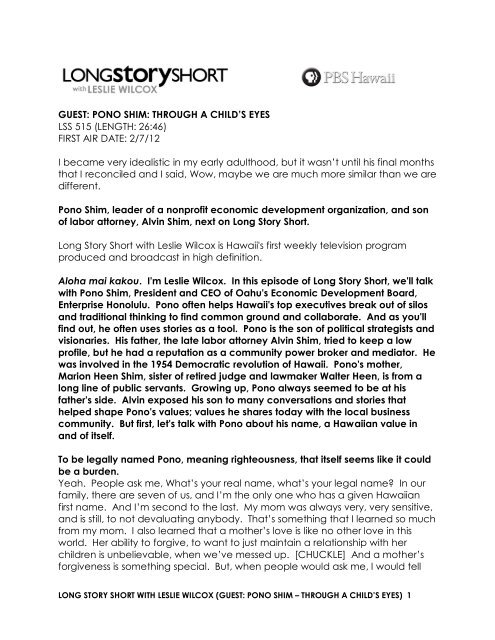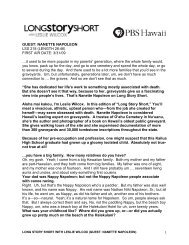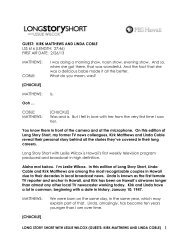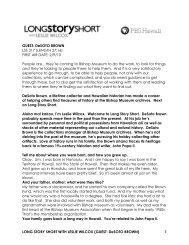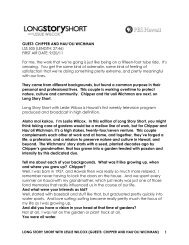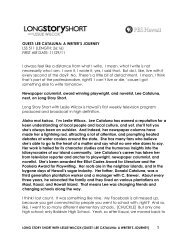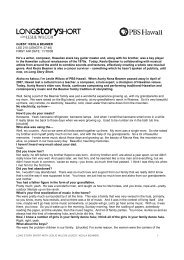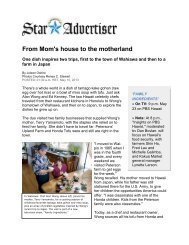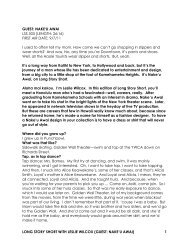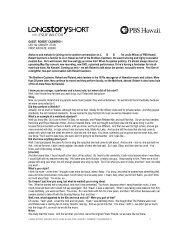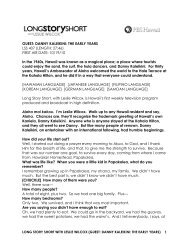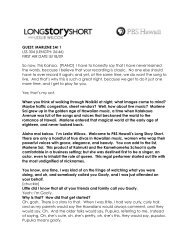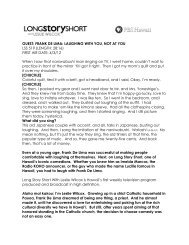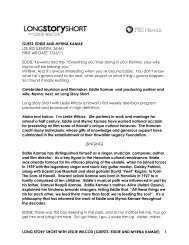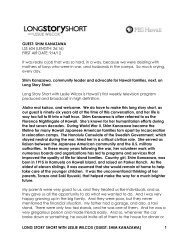GUEST: PONO SHIM: THROUGH A CHILD'S EYES ... - PBS Hawaii
GUEST: PONO SHIM: THROUGH A CHILD'S EYES ... - PBS Hawaii
GUEST: PONO SHIM: THROUGH A CHILD'S EYES ... - PBS Hawaii
Create successful ePaper yourself
Turn your PDF publications into a flip-book with our unique Google optimized e-Paper software.
<strong>GUEST</strong>: <strong>PONO</strong> <strong>SHIM</strong>: <strong>THROUGH</strong> A CHILD’S <strong>EYES</strong><br />
LSS 515 (LENGTH: 26:46)<br />
FIRST AIR DATE: 2/7/12<br />
I became very idealistic in my early adulthood, but it wasn’t until his final months<br />
that I reconciled and I said, Wow, maybe we are much more similar than we are<br />
different.<br />
Pono Shim, leader of a nonprofit economic development organization, and son<br />
of labor attorney, Alvin Shim, next on Long Story Short.<br />
Long Story Short with Leslie Wilcox is <strong>Hawaii</strong>'s first weekly television program<br />
produced and broadcast in high definition.<br />
Aloha mai kakou. I'm Leslie Wilcox. In this episode of Long Story Short, we'll talk<br />
with Pono Shim, President and CEO of Oahu's Economic Development Board,<br />
Enterprise Honolulu. Pono often helps <strong>Hawaii</strong>'s top executives break out of silos<br />
and traditional thinking to find common ground and collaborate. And as you'll<br />
find out, he often uses stories as a tool. Pono is the son of political strategists and<br />
visionaries. His father, the late labor attorney Alvin Shim, tried to keep a low<br />
profile, but he had a reputation as a community power broker and mediator. He<br />
was involved in the 1954 Democratic revolution of <strong>Hawaii</strong>. Pono's mother,<br />
Marion Heen Shim, sister of retired judge and lawmaker Walter Heen, is from a<br />
long line of public servants. Growing up, Pono always seemed to be at his<br />
father's side. Alvin exposed his son to many conversations and stories that<br />
helped shape Pono's values; values he shares today with the local business<br />
community. But first, let's talk with Pono about his name, a <strong>Hawaii</strong>an value in<br />
and of itself.<br />
To be legally named Pono, meaning righteousness, that itself seems like it could<br />
be a burden.<br />
Yeah. People ask me, What’s your real name, what’s your legal name? In our<br />
family, there are seven of us, and I’m the only one who has a given <strong>Hawaii</strong>an<br />
first name. And I’m second to the last. My mom was always very, very sensitive,<br />
and is still, to not devaluating anybody. That’s something that I learned so much<br />
from my mom. I also learned that a mother’s love is like no other love in this<br />
world. Her ability to forgive, to want to just maintain a relationship with her<br />
children is unbelievable, when we’ve messed up. [CHUCKLE] And a mother’s<br />
forgiveness is something special. But, when people would ask me, I would tell<br />
LONG STORY SHORT WITH LESLIE WILCOX (<strong>GUEST</strong>: <strong>PONO</strong> <strong>SHIM</strong> – <strong>THROUGH</strong> A CHILD’S <strong>EYES</strong>) 1
people, not in front of my siblings, that well, it’s probably ‘cause I was the only<br />
one who needed to be reminded he was <strong>Hawaii</strong>an. And I also was told how to<br />
behave, ‘cause I probably wasn’t too behaved.<br />
But you were named that when you were born, right, before you had a chance<br />
to misbehave.<br />
Yeah, my dad loved that name. Yeah. And I have a cousin who’s named—<br />
and this was before Pono was popular as a name.<br />
Yes.<br />
Just simple. I don’t want to make too much of it, because people often do.<br />
They do, and they say, Wow, you’re your name. I don’t know if that’s fair to<br />
other people.<br />
You were a public school kid, living in Manoa, and you had a very different<br />
experience than I’d say any kid in your ahupuaa. What was your childhood<br />
like?<br />
Dad was real busy. Mom, at the time, got to stay home and take care of my kid<br />
brother and I, who were the youngest. So, ‘cause we were the youngest, I grew<br />
up with Mom at home. And we didn’t know, really, who our father was, I think.<br />
He was just Dad. And for me, what I was able to do was, spend a lot of time<br />
with him, even though he was as busy as he was. And I remember a friend<br />
recently told me that, Your father used to say he’d be out twenty-nine days out<br />
of a month in board meetings for dinners. And that’s what it was. But for me, I<br />
didn’t notice that, because I remember Dad coming home late, and the treat<br />
was, I got to take Dad’s socks off. When he’d come home, he’d sit on the<br />
couch, he was tired, and I’d take off his socks. And we’d have dinner. He’d<br />
have dinner sometimes late, or just sit down and talk, read the paper. One of<br />
the things I remember the most enjoyable in my childhood was, everyone would<br />
go to bed, and he and I would be downstairs and we’d listen to music ‘til<br />
maybe eleven, twelve, one o’clock. He’d just fall asleep in his chair. And I’d be<br />
down there with him, just listening to music. And that’s very, very poignant<br />
times. Kind of like just moments of peace and solitude. We’d listen to <strong>Hawaii</strong>an<br />
music, we’d listen to jazz music. He loved music. So growing up, I spent a lot of<br />
time on the weekends, and late at night with my father. But, yeah, I had a<br />
different type of childhood, I think.<br />
And your father, of course, was a visionary, a political strategist, a labor lawyer.<br />
He was active in the Democratic revolution of 1954. He gave advice to top<br />
leaders in the community.<br />
He would say he didn’t, but yeah, he did.<br />
Did you see some of those meetings take place?<br />
Many; because I was with him on weekends. And it wasn’t like he needed to<br />
entertain me. I mean, I was eight years old, and I’d just go with Dad to the<br />
office. I’d be in lunches with he and Blackie Fujikawa, and Norma Moon,<br />
political leaders. I remember when my dad interviewed John Waihee to be a<br />
member of the firm. I remember it was a Sunday evening. I was eleven years<br />
old, I was sitting on the floor reading a National Geographic, and he was<br />
LONG STORY SHORT WITH LESLIE WILCOX (<strong>GUEST</strong>: <strong>PONO</strong> <strong>SHIM</strong> – <strong>THROUGH</strong> A CHILD’S <strong>EYES</strong>) 2
interviewing John. And hired John that night.<br />
Do you remember what was discussed?<br />
No. I don’t remember necessarily the content, but it was the context of the<br />
conversations. I remember the day after a prominent labor leader was<br />
murdered in <strong>Hawaii</strong>, and being at lunch with Norma Moon, and that<br />
conversation.<br />
And who was Norma Moon?<br />
Norma, I think, was with the Carpenters Union at that time. I think. But she was<br />
very heavy in the labor movement, and a good confidante of my dad’s too.<br />
And what happened with the labor leader was killed?<br />
He was a real close friend of my dad’s, and his son actually was one of my close<br />
friends at Stevenson Middle School. My recollection is that, okay, Mom gets a<br />
phone call, and she looks at me, and she said, Joe Lii was just murdered.<br />
This is Josiah Lii of the—<br />
Yes.<br />
It was the Seamen’s Union?<br />
Yes; I think Seafarers.<br />
Seafarers; okay.<br />
And then a lot of tears, but a lot of fear and anger. What caused this to<br />
happen? And so, the next day, I remember going to lunch with my dad and<br />
Norma, and just talking about what had happened, and trying to calm things<br />
down. Because he has a big family, comes from Papakolea, there was a lot of<br />
hurt. And really, how do we stop anything else from happening. And so, I was<br />
there when those discussions were going on. Yeah.<br />
Pono Shim absorbed and learned from the many discussions his father Alvin<br />
Shim had with union leaders and other <strong>Hawaii</strong> figures. As a child, Alvin also was<br />
an observer who became a doer. He served in the Merchant Marine, earned<br />
economics and law degrees at UH Manoa and George Washington University,<br />
and picked up nuances of labor and union issues at the Wage Stabilization<br />
Board. He returned to Honolulu in 1953 and began practicing law, and two<br />
decades later, started the law firm now know as Shim & Chang. His father's<br />
journey, which included a revealing lunch meeting between Alvin and a certain<br />
billionaire taught Pono lessons in determination, relationship building, and<br />
influence.<br />
What did you learn from your dad?<br />
Oh, gosh.<br />
I take it he didn’t sit down and tell you, Son, here’s the way it is. This is stuff you<br />
just learned through osmosis?<br />
What did I learn from Dad … so much. Guardianship … lot of guardianship.<br />
Here was a man who was born very, very poor, whose parents were divorced<br />
really young. And so, he would tell me that he really was raised like an orphan.<br />
And then he came to Kamehameha from Maui, and when he came, he was so<br />
LONG STORY SHORT WITH LESLIE WILCOX (<strong>GUEST</strong>: <strong>PONO</strong> <strong>SHIM</strong> – <strong>THROUGH</strong> A CHILD’S <strong>EYES</strong>) 3
poor. I remember Uncle Bill Amona when my dad died, he was my dad’s<br />
classmate. He said, Pono, when did your dad make his decisions that his life<br />
would be committed to making a difference for people, to serving people?<br />
You see, he never really talked about that. And Uncle Bill said, When we were<br />
at Kamehameha, all of the students were boarders. This was at Bishop Museum.<br />
And he said, I have these pictures of watching your dad almost like his hands<br />
are under his chin on the fence. Because all of us from Oahu would get visitors<br />
on weekends, and they’d come, and they’d sometimes take us home, but<br />
they’d always bring food and gifts. And he says, I can just see your dad kinda<br />
just watching us. Nobody ever came for him. And he had this smile on his face.<br />
He didn’t hold it in a negative light, but he would just observe. And he said,<br />
Something keeps taking me back to those moments.<br />
So, he went from being essentially a loner at the fence, kind of dreaming, with<br />
nobody coming to see him, to having friends from many walks of life, and a big<br />
family.<br />
Yeah. Well, I wouldn’t say he was a loner, ‘cause my dad was kolohe. I mean,<br />
really, really kolohe. His oldest and best friend was Uncle David Peters. And<br />
Uncle David tells a story, and he’ll still tell you the story of how the two of ‘em got<br />
arrested at age five.<br />
Five?<br />
Yeah. He said, Officer Hanohano arrested these two boys who weren’t in<br />
school. So vagrancy. And, they would blame each other. Yeah, your father<br />
got me arrested. And, I don’t think anybody who knows Uncle David and my<br />
dad would say it was Uncle David. My dad was kolohe. But yes, he had a lot of<br />
friends. Very, very engaging, very well connected.<br />
What was the secret to his forging so many tight relationships?<br />
When I was in kindergarten, my first day of school, I came home and he said,<br />
How many friends did you make today? And I said, None. And he said, Weren’t<br />
there other kids there? I said, Yeah. So he said, Let me teach you how to make<br />
a friend. And he stuck out his hand and he said, Hi, my name is Pono, what’s<br />
your name? And so, he practiced with me. And probably the most significant<br />
thing ever taught to me in life was that, if there’s one thing I look back at. The<br />
first day of school, came home, Dad said, How many friends did you make<br />
today? And so, I’d like to believe that’s what he was doing, and he’d make<br />
friends. But then, how do you keep friends? That’s the thing. And I think it’s<br />
because he was able to really focus in on the relationship, and put a priority on<br />
the relationship.<br />
Even though he had all kinds of other things going on?<br />
All kinds of things.<br />
How’d he do it?<br />
Here’s an example, a story of a friend. He used to sit across the table and just<br />
battle with Harry Weinberg. HRT, and my father was fighting for labor. And he<br />
would tell us that he would be fighting for a dime for the employees.<br />
A dime per hour, or a dime per year?<br />
LONG STORY SHORT WITH LESLIE WILCOX (<strong>GUEST</strong>: <strong>PONO</strong> <strong>SHIM</strong> – <strong>THROUGH</strong> A CHILD’S <strong>EYES</strong>) 4
Dime per hour.<br />
Okay.<br />
And, he was just fighting, and fighting. And my dad thought everything that I<br />
shouldn’t mention on the air about Harry. [CHUCKLE] And including his ethnicity<br />
and the whole bit. Right? And it was six months before Harry dies, and my dad<br />
gets a call from him. And he said, Alvin, I’d like to take you to lunch. And so,<br />
they went to Halekulani, and my dad said they ate hotdogs.<br />
[CHUCKLE]<br />
And he said Harry asked him, Alvin, if you had my wealth, Jeanette is gone,<br />
you’ve been given six months to live, your son is gonna be taking care of, what<br />
would you do with it? So my dad started to describe how he would establish a<br />
trust. Take care of the poor people, establish programs, matching funds, do it all<br />
over the world, education, housing, food. And he just designed this entire<br />
structure of what he would do with Harry’s wealth. And at the end of the<br />
conversation, Harry just listened, and then he looked at my dad and he said, I<br />
just wanted to make sure, because that’s what I’ve done.<br />
[GASP]<br />
And my dad said he almost fell off his chair.<br />
Because he saw Harry Weinberg as somebody who was a grasping money guy,<br />
not somebody who gave it away. And to that point, Mr. Weinberg had not.<br />
Right. And so, my dad just was in shock, because he didn’t realize that he had<br />
become a conscience for this man over the years and years of battling, that at<br />
the end, Harry needed my dad’s approval.<br />
Because Mr. Weinberg knew that your dad cared about the common person.<br />
I guess.<br />
Everyday worker.<br />
I guess, because you look at what he’s done, what Harry’s done. And so, one of<br />
the things I see when I drive around town, and I see Harry and Jeanette<br />
Weinberg up on buildings, I see a name that other people don’t see.<br />
Your father’s.<br />
Because if not for that name, these buildings might not be here. And he would<br />
never want his name on a building.<br />
You spent your childhood sort of at your dad’s knee, just sort of immersed in<br />
what he was doing, or the tone of what he was doing.<br />
Yeah.<br />
And he was your friend, and your father.<br />
M-hm; for most of my life. [CHUCKLE] We had our serious battles.<br />
Over what?<br />
I became very dogmatic.<br />
About what?<br />
Religion, politics, business, and I became very idealistic in my early adulthood.<br />
But it wasn’t until his final months that I reconciled and I said, Wow, maybe we<br />
are much more similar than we are different. [CHUCKLE] And I think other<br />
people would recognize there is something to that.<br />
LONG STORY SHORT WITH LESLIE WILCOX (<strong>GUEST</strong>: <strong>PONO</strong> <strong>SHIM</strong> – <strong>THROUGH</strong> A CHILD’S <strong>EYES</strong>) 5
And you started at the University of <strong>Hawaii</strong> at Manoa. You didn’t finish.<br />
No.<br />
And that kind of surprises me.<br />
[CHUCKLE] It was funny, because at one point, I said, Dad, can I go back to<br />
Japan? I just want to work. He says, No, you gotta finish school. And at the<br />
time, I was also dancing in hula, so I was dancing for Frank Kahala and the the<br />
Gentlemen of Maluikeao, and we were very competitive in the Merrie Monarch.<br />
And it was gonna be my second Merrie Monarch, I think this was 1985, and I just<br />
said, Dad, I’m gonna take a semester off from school, so I can finish up hula,<br />
and then I can go back to school, and I’ll become a lawyer. And he said,<br />
Okay. So I took a semester off. And they haven’t seen me for twenty-seven<br />
years. [CHUCKLE]<br />
For much of that twenty-seven-year period, Pono Shim worked in the restaurant<br />
and marketing industries. Then, by a twist of fate, Pono met with a former State<br />
Senator from Maui, Nadao Yoshinaga, better known as Najo, who led Pono to his<br />
career as a CEO. Back then, Enterprise Honolulu was being led by a<br />
consummate economic development expert, Mike Fitzgerald.<br />
When you were named to head Enterprise Honolulu, which represents some of<br />
the top companies in <strong>Hawaii</strong>, you were considered an unconventional choice.<br />
Now, why is that? Look at yourself and say, Now, why would I be an<br />
unconventional choice?<br />
Honestly, I have no economic development background. I’ve tampered in<br />
business, but really, economic knowledge, background, traditional, no. I have<br />
no degree to stand on, no graduate degree or undergrad degree. So, I really<br />
was an outsider. The other thing is, I guess for the most part, even though I had<br />
all these relationships, I didn’t play downtown. I wasn’t at the Capitol. Knew a<br />
lot of people, but for some odd reason, for forty-five years, I’ve kind of just not<br />
been down there.<br />
What have you been doing?<br />
I was husband, being in business, dad, son.<br />
What kind of business?<br />
The last business I had was the concierge services at Ward, so I had a concierge<br />
service in the largest cinema in <strong>Hawaii</strong>, and a VIP system that we had<br />
developed, or I was in the restaurant industry for twenty years. I was just doing<br />
things. So when I showed up, it was different. And the only reason why I did<br />
show up was because I was starting to write a book, and I went to interview<br />
Najo Yoshinaga. And at the end of the interview, Najo asked me, Pono, do you<br />
know my predecessor? And I said, No. He says, He’s a good guy, really cares<br />
about <strong>Hawaii</strong>, one of the top economists brought to <strong>Hawaii</strong> to help us diversify.<br />
But he’s having a hard time. So, I went to meet Mike, and I said, Mike, tell me<br />
your story. And he shared with me how he had come to <strong>Hawaii</strong>, what he found,<br />
where he had been, the success that he had, the studies that they did, the third<br />
LONG STORY SHORT WITH LESLIE WILCOX (<strong>GUEST</strong>: <strong>PONO</strong> <strong>SHIM</strong> – <strong>THROUGH</strong> A CHILD’S <strong>EYES</strong>) 6
party confirmations that proved what his strategies were would work. I felt like<br />
he was a pretty sincere guy. So I just asked him, when he was done, Mike, who<br />
are your storytellers? And when I asked him that question, it was a real shock to<br />
him, because that’s not an economic question.<br />
Yeah. And he was basically telling you that he felt stymied and boxed in, like<br />
he had the right idea, but he just couldn’t make things happen.<br />
Correct. And that’s why I asked him, Who are your storytellers? And he thought<br />
about it, and he says, I guess I’ve been so busy since I got here, I didn’t take<br />
time to find storytellers. M-hm. And then, he said, I don’t think we’ve been<br />
telling the right story. In fact, we’ve done a very poor job telling the story. And I<br />
said, I know. And I made a statement, Mike, if you have a vision as big as you<br />
have, you have to find those individuals who can tell the story so large,<br />
everyone fits. And today, most people have no idea how to do that anymore.<br />
They can tell it from their sectors, they can tell it from their silos, but they don’t<br />
know how to tell the story so large that everyone fits. And he looked at me,<br />
really intrigued. And so, I shared with him five stories. And at the end of the fifth<br />
story—and these were stories that when things were fractured, I would tell a<br />
story and things would just shift. And it’s not an argument, it was just a reflection,<br />
almost like a parable. And at the end of the fifth story, he looked at me and he<br />
said, Pono, I don’t think I’m supposed to be running this company, I think you<br />
are. I said, I didn’t come here to take your company. So, Najo just asked me to<br />
help you, and I’m gonna help you however I can. And, started to just donate<br />
my time, and started to work with the organization. And then, right before the<br />
end of the year—this was in 2008, right at the heat, the beginning of the crash.<br />
And it was the week before the end of the year, and Mike came to me and<br />
said, Pono, we’re gonna put you on staff. And I said, Okay, what are you gonna<br />
hire me as? He says, We’re gonna hire you as our organizational kahu. And I<br />
said, You know what you’re doing? And he said, Yeah. You realize that you’re<br />
probably the only economic development board or organization in the country<br />
hiring somebody to be their guardian? He said, Yeah. Okay; just as long as you<br />
know what you’re doing. So, I was hired as the kahu for Enterprise Honolulu.<br />
And then a few weeks later, the board had a meeting and I was appointed<br />
vice president and kahu. And then, within five months, Mike had left <strong>Hawaii</strong>,<br />
and I was asked to become the CEO.<br />
And so, you’re the executive director of this organization that has titans of<br />
industry supporting it, and you don’t have the same kind of business experience<br />
as they do. Does it matter?<br />
At first, I think it mattered. I don’t think it matters anymore. And it’s a lot of that<br />
foundational stuff that I grew up with. Part of that childhood that you had<br />
referred to, there were things imparted on me throughout my life, through my<br />
childhood, that I wouldn’t realize were so profound and important that they<br />
would be needed at this time. For example, Auntie Pilahi Paki, who was known<br />
as the keeper of the secrets of <strong>Hawaii</strong>. Auntie Pilahi was someone who<br />
LONG STORY SHORT WITH LESLIE WILCOX (<strong>GUEST</strong>: <strong>PONO</strong> <strong>SHIM</strong> – <strong>THROUGH</strong> A CHILD’S <strong>EYES</strong>) 7
introduced the world to the concept that aloha was the answer in 1970. She<br />
gave that prophecy.<br />
And she wasn’t a Pollyanna, Mary Poppins kind of person. She was real.<br />
Auntie Pilahi was real. She was a Maui girl, born in Lahaina. And she was given<br />
a gift from this man, Luahine. Before he passed, he breathed his ha into her.<br />
And he called for her. She flew to the Big Island, and he passed this knowledge,<br />
this wisdom, these values on to her. And now, she became the keeper of the<br />
secrets. And so imagine it’s 1970, and the Governor has called a Governor’s<br />
conference. Where are we gonna be in the 21st century, in thirty years? And<br />
it’s a difficult time. There’s the Vietnam War, there’s the <strong>Hawaii</strong>an Renaissance<br />
going on, there’s civil rights, women’s rights, what was happening at Kent State,<br />
Cal Berkeley.<br />
A lot of ragged edges, everywhere.<br />
I mean, it was kinda like now. Deaths on our college campuses. Well, they’re<br />
not shooting, they’re just praying now. But there were a lot of strife. And out of<br />
the side, this kupuna starts walking up on stage, amongst all of the strife. And<br />
she’s wearing a red and white muu, and she walks up on stage and grabs the<br />
microphone. And a friend of mine, Colbert Matsumoto, was sixteen years old, a<br />
student delegate from Lanai in there. And he said, We thought that this lady<br />
was a crackpot, because she wasn’t on the agenda, but she’s walking up to<br />
the microphone. Imagine these arguments going on, and she’s walking up.<br />
And, out of your corner of your eye, I would imagine most people stopped<br />
arguing, because they’re watching this lady heading for the microphone. And<br />
she introduced <strong>Hawaii</strong> to the deeper meanings of aloha, as an acronym.<br />
Like his father Alvin, Pono Shim has won kudos behind the scenes as a mediator,<br />
helping resolve tough problems in inclusive, respectful ways. He demonstrates<br />
how in today's world our roots in the form of stories and traditional values can<br />
break barriers and inspire innovation. We've seen how being at his father's side<br />
influenced Pono a great deal. He also credits his mother Marion's wisdom. And<br />
there are other elders, including Auntie Pilahi Paki and Nana Veary, who would<br />
also have an impact on Pono. We'll find out how these, and other cultural icons<br />
influenced Pono Shim in an upcoming episode of Long Story Short. For <strong>PBS</strong><br />
<strong>Hawaii</strong>, I'm Leslie Wilcox. A hui hou kakou.<br />
For audio and written transcripts of this program, and all episodes of Long Story<br />
Short with Leslie Wilcox, visit pbshawaii.org.<br />
I'm actually in the process of re-enrolling into school.<br />
In your forties?<br />
Because I'm on the advisory council for University of <strong>Hawaii</strong> West Oahu. I'm so<br />
fortunate Jean Awakuni asked me to join their advisory council, and I think I'm<br />
the only one in there without a degree. And maybe if I go back to school,<br />
maybe that'll inspire some kids on the West side and the North side. Here Uncle<br />
LONG STORY SHORT WITH LESLIE WILCOX (<strong>GUEST</strong>: <strong>PONO</strong> <strong>SHIM</strong> – <strong>THROUGH</strong> A CHILD’S <strong>EYES</strong>) 8
Pono's going back to school, he's in Manoa, he's coming out to the Ewa side,<br />
he's a CEO; maybe we should go.<br />
LONG STORY SHORT WITH LESLIE WILCOX (<strong>GUEST</strong>: <strong>PONO</strong> <strong>SHIM</strong> – <strong>THROUGH</strong> A CHILD’S <strong>EYES</strong>) 9


